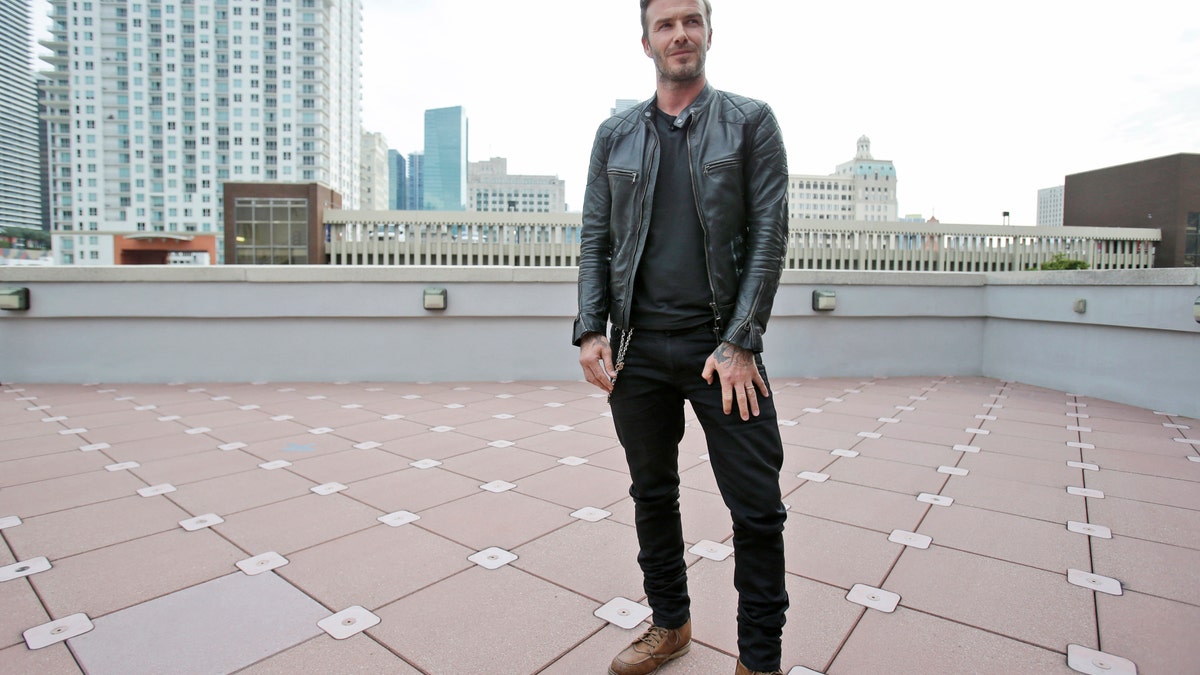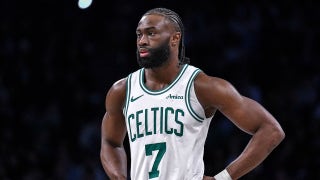
March 24, 2014: In this file photo, former England soccer star David Beckham speaks during a news conference in Miami. (AP)
MIAMI – Two months have passed since English soccer star David Beckham hopped on a stage, his back to Miami's sparkling Biscayne Bay, and announced plans to start a Major League Soccer franchise. The plan -- and Beckham -- have been almost universally accepted by every sector of the city.
What his international fame has not been able to attract: agreement on where to put the stadium.
"Until a few weeks ago, it was very smooth," Beckham said. "And nothing that wants to be -- in my eyes, has to be -- successful, was ever going to be that smooth."
Beckham and his team have set their sights on the Port of Miami, 520 acres known as the "Cruise Ship Capital of the World" and the "Cargo Gateway to the Americas." Nearly every portion of the port has been developed, with one notable exception: The southwest corner with a spectacular Miami skyline view .
The plan's chief opponent is the Miami Seaport Alliance, a coalition of business and political leaders including Royal Caribbean Cruises, one of the world's largest cruise operators. Its offices are next to the proposed site.
The alliance contends the stadium would threaten cruise and cargo operations, creating increased traffic and security risks -- concerns Beckham's partners insist are unfounded. The coalition also argues a stadium would ultimately endanger the 207,000 jobs the port supports, while creating less-lucrative positions like concession stand employees.
"A soccer stadium at PortMiami is downright nutty," declares an ad the coalition printed in several newspapers.
There is much at stake for the port: The county is spending more than $2 billion on capital improvements to make Miami a global logistics hub. The port is being deepened to accommodate the larger ships that will traverse the expanded Panama Canal, set to open in 2015. The port is about $1 billion in debt, making it one of the nation's most indebted. Moody's recently cut its credit rating.
"We're talking about huge economic input or huge economic loss," said John Fox, the alliance's president and a former Royal Caribbean executive.
One option mentioned to improve the port's finances: Commercial development of the port's southwest corner. The port's master plan notes commercial real estate income generates revenue for other ports, but opponents say Beckham's plan won't provide that.
"The port and tourism are the two engine drivers of Miami," said Norman Braman, a billionaire car dealer and former Philadelphia Eagles owner supporting the Miami Seaport Alliance. He unsuccessfully opposed the Miami Marlins baseball stadium, but then led the successful 2011 recall of the county mayor who pushed it through without holding an election. "And a stadium and commercial development that's been proposed just doesn't belong there."
Beckham's consultant, John Alschuler, a real estate adviser who has led waterfront development projects in New York City, Hong Kong and other metropolises, said development of a stadium and other commercial property would likely generate $6 million to $10 million in annual revenue.
He said fewer than 100 jobs would be created directly by the franchise, but thousands more would result indirectly at restaurants and nearby businesses. Alschuler also denied traffic congestion would worsen, noting fans wouldn't arrive until around 6:30 p.m., hours after the cruise ships have sailed.
"It's sheer, deliberate, willful misinformation," Alschuler said of the alliance's claims.
South Florida's last soccer team, the Miami Fusion, played 30 miles north of the port and lasted only three years until 2001 because of low attendance.
That history, perhaps, led Beckham and associates to two conclusions: The stadium must be downtown, and the team must win
The decision ultimately rests with the mayor and county commission. Miami-Dade Mayor Carlos Gimenez has asked Beckham to consider an alternative site near the Heat's arena. But he said he could potentially support a Port of Miami stadium.
Beckham, for his part, came back to Miami on Tuesday, holding private meetings with commissioners and weighing Gimenez's suggested site.
"We want to be a positive for people," Beckham said. "This part of America has not had a soccer team for quite a few years, and they deserve one."








































